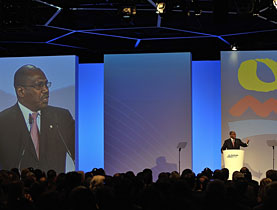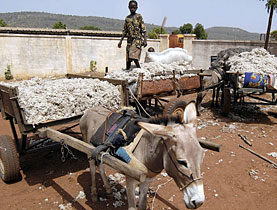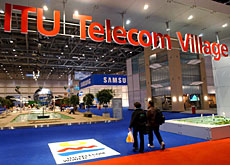Telecoms industry weathers financial storm

The telecommunications industry seems to have avoided the worst of the global economic meltdown, according to an International Telecommunication Union (ITU) report.
The 90-page study was presented on Monday at the opening of the weeklong Telecom World trade fair, which the ITU is hosting at the Palexpo exhibition centre in Geneva.
According to the report’s authors, the financial crisis has failed to dent demand for information and communication technology (ICT) services, with the mobile and satellite sectors proving remarkably resilient.
Consumer demand for high-speed fixed and mobile connections is continuing to fuel growth in broadband subscriptions in major markets worldwide, including Brazil, China and the United States, it added.
“I’m hoping the ICT sector will help take the world out of the current financial crisis,” ITU secretary-general Hamadoun Touré told journalists on Monday. “Over the past five years ICT has been the most resilient sector and has created two-thirds of new jobs.”
During the current downturn, governments and individuals have been forced to cut back in many ways, he said, but “no one has given up their phone and people are communicating”.
Franco Monti, an analyst at PricewaterhouseCoopers responsible for telecoms, media and entertainment, had a more balanced outlook.
“Cable and broadcast operators are less affected than other sectors. Their financial situation is more or less stable,” he told swissinfo.ch.
“As to mobile phones, pre-paid subscriptions are not being renewed as frequently as before the crisis and this type of contract can represent 60 per cent of subscriptions for some firms.”
Network equipment suppliers are suffering more than the operators, but telecoms are by and large less affected than other industry sectors, he agreed.
Government strategy
The ITU report said reduced funding was slowing operators’ investment plans to upgrade existing networks and roll out next-generation networks.
Governments should consider investing some of their stimulus funds in mobile phone networks, fibre-optic connections and broadband infrastructure as part of an effort to boost the wider economy, it said.
Focusing on governments and industry is part of the new strategy by the organisers of this year’s Telecom World. Heads of state and top officials from 30 countries, including many from Africa, are making the journey to Geneva.
The spread of information technology in the developing world, in particular mobile phones, is having momentous implications.
In 2000, developing countries accounted for around a quarter of the world’s 700 million mobile phones. By the beginning of 2009, their share had grown to three-quarters of a total which had risen to over four billion.
No begging bowl
On Monday Rwanda’s president, Paul Kagame, who has pushed ICT initiatives in Africa, stressed the essential role of technology in today’s world.
“ICTs are an indispensable part of people’s lives and are now one of the major drivers of economic recovery,” he said.
“In Rwanda we’ve long recognised the importance of ICTs and have made them a priority in all areas of society, especially education, healthcare and business.”
He also underlined the rapidly improving investment climate in Africa, citing a recent World Bank report on doing business in Africa.
Touré said developing countries were not coming to developed countries with a “begging bowl” but with “proposals which will work for the benefit of all”.
Since the ITU Connect Africa Summit in October 2007, some $8 billion (SFr8.25 billion) has been invested in Africa in ICT. A similar event, Connect CIS, is planned this November in Minsk, Belarus, for the Commonwealth of Independent States (CIS) and neighbouring states, followed by regional summits in Asia, Latin America and the Middle East next year.
Less attractive
The weeklong fair in Geneva is expected to attract 40,000 people and 450 exhibitors from 50 countries, with 30 national stands.
But this is less than the previous ITU Telecom World in Geneva in 2003, which pulled in 115,000 visitors and 900 exhibitors. And the overall trend is down from glitzier events in the 1990s: the 1999 fair attracted 200,000 people.
Firms like Cisco, IBM, Microsoft, Samsung and China Mobile have made the trip but many major companies, including Nortel, Ericsson, Nokia and Siemens, are staying away from this year’s event, citing tighter budgets.
Another factor behind lower attendance is competition from similar events like the GSM Mobile World in Barcelona.
“And the internet and real-time public information also call into question the added value of such trade fairs,” said Franco Monti.
Simon Bradley in Geneva, swissinfo.ch
Since the first Telecom World fair in 1971, Geneva has always hosted the event.
In 2003 Telecom World attracted 115,000 visitors, down from 200,000 in 1999. About 900 exhibitors from 50 countries were present. The event generated about SFr600 million in direct and indirect revenues for the region.
In 2006 the event was moved to Hong Kong.
The 2009 fair is expected to attract some 40,000 people and 450 exhibitors from 50 different countries, with 30 national stands.
A total of 31 Swiss ICT firms will be present under on the 700 square metre “Lake Geneva Region” stand – the second biggest at the fair.
And 16 emerging companies and research institutes from the Lake Geneva region will also be showcased by the Alp ICT cluster platform.
Geneva has already started planning the organisation of the 40th anniversary edition of Telecom World in 2011.

In compliance with the JTI standards
More: SWI swissinfo.ch certified by the Journalism Trust Initiative





You can find an overview of ongoing debates with our journalists here . Please join us!
If you want to start a conversation about a topic raised in this article or want to report factual errors, email us at english@swissinfo.ch.